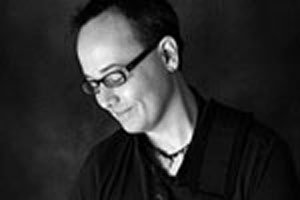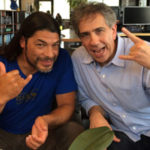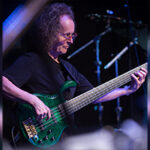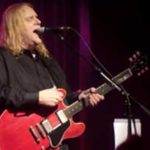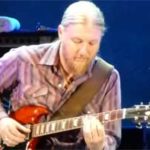Tennessee native discusses his musical upbringing, education and forming a record company
Exclusive interview with FBPO’s Jon Liebman
May 10, 2010
Tennessee native Joseph Patrick Moore is an accomplished bassist, composer, arranger, producer, author and educator. An alumnus of University of Tennessee-Knoxville and University of Memphis, Joseph has played with a wide variety of musical artists, including Marie Osmond, Herb Ellis, Jerry Lewis, Carrol Channing, and many others. While in Tennessee, Moore studied with Rusty Holloway, Donald Brown and the legendary Jerry Coker, and was the recipient of the prestigious Milt Hinton Scholarship for the study of jazz bass.
After moving from Tennessee to Atlanta, Georgia, Joseph was hired by Colonel Bruce Hampton to play bass in his popular Fiji Mariners band. Moore has since performed with Buddy Miles, Earl Klugh, Chris Duarte, Stewart Copeland, and many others. Joseph’s newest release, To Africa With Love, was released in May 2010 on Moore’s own Blue Canoe Records.
FBPO: Tell me about your musical upbringing. Didn’t you take a roundabout path to the bass, via the saxophone and drums?
JPM: Yes, that is correct. I started playing the saxophone in 4th grade band and kept that up through the 9th grade. At that time, I switched to drums for the marching band. It wasn’t until midway through high school that I actually started playing electric bass, then, upon graduating high school, I started to explore the double bass. I believe the early years of studying saxophone and drums really helped shape who I am today. I’m a big believer in music education, as that is where many people, including me, are nurtured and have an opportunity to explore this creative avenue. If I didn’t have the experience of music in the schools, I’m positive I wouldn’t be in music today.
FBPO: How do you think growing up in Tennessee influenced you musically? Were you exposed much to the Nashville scene or were you more interested in jazz?
JPM: The entire state of Tennessee has a rich musical heritage. Knoxville, on the eastern side of the state, has more of a bluegrass/roots feel, while Memphis, on the western side, has the blues/Stax tradition. Of course Nashville, in the middle of the state, has the country/singer songwriter/gospel vibe. I grew up in Knoxville. It wasn’t until I turned 23 that I moved to Memphis, where I lived for about seven years. I feel blessed that I was able to soak up both angles of Tennessee’s musical culture. I’ve been through Nashville a hundred times, though I’ve never spent more than a few days at a time there. While I love all styles of music, I’ve always enjoyed the blues/Stax/Memphis vibe over the Nashville and east Tennessee traditions. That being said, I do get to Nashville from time to time and have a lot of great working relationships in that city.
FBPO: What was it like to study with the legendary Jerry Coker?
JPM: Jerry is a very spiritual, wise and gentle soul. He had an amazing aura around him and was probably the most encouraging educator I’ve ever experienced. Jerry helped shape the music programs at the University of Miami, Indiana University and UTK (The University of Tennessee – Knoxville). Among the music luminaries he influenced are Pat Metheny, Jaco, Mark Egan, Randy Brecker and so many others. Along with studying with bass with Rusty Holloway and piano with Donald Brown, both at UTK, I studied privately for about a year with Jerry. He was so involved in motivating all his students. He would never miss a recital, lecture or concert, whether the students performing were his private students or not. Jerry has written several books and I know he teaches and lectures at Jamey Aebersold’s camps from time to time. Jerry Coker is officially retired and has been since about 1992. I don’t believe he teaches or performs much anymore, but his impact is still being felt by many of us.
FBPO: The music world recently lost Herb Ellis, one of history’s jazz guitar greats. What can you tell me about playing with him?
JPM: I played a concert with him while I was in Memphis, probably around 1995 or so. It was with the Memphis Jazz Orchestra, a big band comprised of former retired Navy musicians, mixed with other local players from around town. Herb brought his own charts and we rehearsed for a few hours and did the show to a sold out room at a now defunct club called Joyce Cobb’s, on Beale Street. I found Herb Ellis to be a very quiet man and an incredible player. He knew exactly what he wanted from the band, particularly the rhythm section. He was a very sweet man and a guitar legend. I was sad to hear of his passing.
FBPO: What prompted you to leave Tennessee for Atlanta?
JPM: I lived in Memphis from 1991 to 1997. By the beginning of 1997, I felt like I had hit the ceiling with opportunities in Memphis. I had played every club, casino and studio session in town. I also worked many Broadway shows that came through town, including The Sound of Music, with Marie Osmond, Hello, Dolly!, with Carol Channing and Damn Yankees, with Jerry Lewis. In addition, I had just recorded my debut CD, Never Never Land, which featured over twenty-five Memphis musicians. While I feel very fortunate to have been able to make a living in Memphis and work with many great musicians, I just felt it had run its course. In addition, the Olympics had just come to Atlanta and several friends from Georgia kept telling me about all the work, possibilities, experiences and greater opportunities in Georgia. All in all, I felt the timing was right to make a shift. The last thing I wanted for my life was to be complacent, so I decided to shake things up a bit.
FBPO: Where did your career take you at that point?
JPM: Soon after arriving in Atlanta, I met Colonel Bruce Hampton, who had heard me play in a free form funk/jazz quartet. Shortly thereafter, he called me to join his newest group, The Fiji Mariners, which had been recording for Capricorn Records. Of course I was familiar with his previous group, the Aquarium Rescue Unit, featuring Oteil Burbridge on bass, Jimmy Herring on guitar and Jeff Sipe on drums, and was honored to be asked to be a part of his latest musical conception. Within several months of joining the group, we scored a summer tour with the last running H.O.R.D.E. (Horizons of Rock Developing Everywhere) tour in 1997. The H.O.R.D.E. tour was a running summer festival that featured many incredible artists: Blues Traveler, Smashing Pumpkins, Barenaked Ladies, Warren Haynes, Mike Gordon and Jon Fishman of Phish, the Derek Trucks Band and many others. Bruce was friends with all of them and most of them sat in with the band at one time or another. I remained with the Fiji Mariners until the band’s demise in 2000.
FBPO: Tell me about Blue Canoe Records
JPM: Blue Canoe started in 2003, basically from the efforts of my own independent projects that were released from 1996 to the present. Since I wasn’t signed to a label, I had to figure out ways to fund my own recordings and distribute and promote my music. Through these experiences, I gained a lot of valuable contacts and built relationships with radio DJs and music media industry folks. The catalyst was in 2003, when I recorded a jazz trio CD with the EMP Project. We really tried to shop the CD, but to no avail. One of the people we sent the mastered CD to was Peter Erskine, former drummer for Weather Report. Peter sent back a nice letter, encouraging us to release the music ourselves. He then went on about what great opportunities lay ahead for “indie” musicians. Since I had already been doing this since 1996, I decided to harness the relationships I had built and push the door wide open. I hired a few people to help me and later got a partner involved with the label. Today, Blue Canoe has twenty-eight artists with over thirty recordings. In my role, I’ve become less involved with the label, as I’m pursuing my own artistic vision.
FBPO: In addition to having had quite an extensive career as a sideman, you’ve released several albums under your own name. You must be particularly excited about your brand new CD, To Africa With Love.
JPM: Yes I am! Normally, I wouldn’t say such a thing, as I tend to be very critical of my own music. I also tend not to listen to my music much after I’ve released it, as I hear how I could or should have done things differently. I’ve often felt that while I’ve been fortunate to have made a career as a sideman and been blessed to be able to work with many amazing musicians and styles, I’ve felt as though I had no identity, sound or direction. Being a “utilitarian” and doubling on double/electric/fretless bass, as well as playing many different styles, such as jazz, funk, rock, country, blues, classical, etc., I have often felt like a jack of all trades and master of none. With To Africa With Love, I feel like I’m getting closer to “who” and “what” I am. While I’m not afraid to take chances, experiment or try new ideas, I feel as though I’m much closer to having an artistic direction and voice with this recording.
FBPO: Talk about your approach to making an album. You seem to put your whole self into it.
JPM: Thank you, I do, sometimes almost to the breaking point of putting myself in a padded white room in the local sanitarium. I tend to start with a concept or theme, i.e., “To Africa With Love,” or past CDs, such as Alone Together, which was solo bass, or Soul Cloud, which was more funk-oriented. The title sets the tone. I formulate a concept and imagine what the “sound” or “instrumentation” should be, based on the “theme” and concept that I’m trying to develop. Since seventy-five percent of my music tends to be instrumental, I sometimes start with a title and use imagery to try to capture the vibe of what the title of the song is projecting. That usually dictates key, tempo, style and an overall sense of direction. Once I establish this concept into place, it is just a matter of tweaking the song until I feel good about the direction of the rhythm, melody and harmony and the general direction of the composition.
FBPO: Now that To Africa With Love has become a reality, what’s your next project?
JPM: Funny you should mention that! I have several ideas written down that I would like to explore, if only there was enough time in the day to commit to them. For starters, I’m knee-deep in learning Earl Klugh and Bob James material right now, as I’m about to go on a West Coast tour with both of them. It is an honor and I’m really excited about this opportunity. I’m trying to dot my “i”s and cross my “t”s, as not to look like a fool on stage with two jazz legends! Once I complete the tour, I will be playing several solo shows to promote To Africa With Love. In fact, I’m trying to schedule trips to Swaziland, South Africa, for several performing opportunities in July. I’m also trying to incorporate Abelton live, mixed with live improvisation, into my shows. It is a bit of challenge in learning new software and how to implement this into a live setting. As far as the next studio album, I will be starting pre-production towards the end of the year on a CD titled, Moore Covers. It will be an all “cover tune” record and I will be exploring pop songs from Whitney Houston to Coldplay. I want to try to put a twist on the songs that I’m selecting, obviously featuring the bass as much as possible. My goal is to have a very minimalist approach and do the exact opposite of what To Africa With Love is about. I’m still working out the concept in my head, but I have the general idea of what I want to shoot for.
FBPO: What do you like to do when you’re not immersed in music?
JPM: I like to get outside as much as possible, even if only for a few minutes, to just sit and observe the nature around me. I also like to go to the movies a lot. Both of these things help me decompress and escape from music and life’s obstacles, thus allowing me to have a fresh approach and fresh outlook on music when I return to it.
